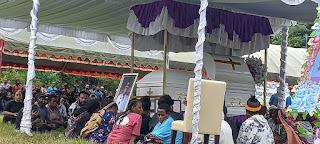Since assuming office last October, John Nalwang, the National Coordinator of the Customary Land Management Office (CLMO), has uncovered extensive corrupt practices dating back several years.
Individuals working in government institutions are allegedly involved in these corrupt practices. A common occurrence is the falsification of mapping documents and tampering of Nakamal & Land tribunal minutes.
Nalwang revealed that boundaries are often expanded beyond the original mapping of customary boundaries. This expansion commonly involves areas of financial interest, such as those with investors, lands set aside for government compensation, and project-related lands. He pointed out that the motive behind these actions is to access funds.
One of Nalwang's first tasks was to have CLMO officers in the provinces review maps of customary boundaries within their jurisdictions and pending green certificate applications. It was discovered that advertised maps of custom boundaries differed from the actual boundaries declared to families or custom owners. This difference picked up during their review revealed the expansion of customary boundaries.
This practice was particularly common in Efate and Santo specifically targeted areas involving money. Nalwang cited the Pakona land case near Devil's Point on Efate and Belbura custom land in Santo as an example. He claimed that a former CLMO National Coordinator was removed from office for reinstating the Green Certificate to declared custom owners of that land.
Nalwang noted that the Pakona land issue has allegedly resulted in the termination of several previous national coordinators. Although processes for determining custom ownership have been completed, various obstacles, including alleged conflicts of interest, have hindered progress.
For the Pakona land case, Nalwang highlighted that the original map showed a small piece of land, but boundaries were expanded, particularly in areas with investors. This case is similar to the Belbura land case, which include falsification of land tribunal minutes to obtain a green certificate which failed and is currently under Police investigation. Similar issues were reported near Epule on the North East of Efate.
On the issuance of Green Certificates, Nalwang admitted that CLMO officers failed to cross-check and verify information, leading to inaccuracies in the mapping. The problem extends to areas like Saratamata on Ambae, where custom landowners allegedly extended boundaries to benefit from government compensation.
These issues, identified during the past three months, involve falsification of documents and wrongful issuance of Green Certificates. Nalwang emphasised the need for CLMO officers to verify information in the field before issuing certificates.
The alleged corruption has reportedly been ongoing for nearly a decade, involving government officers and customs landowners in places like, Efate, Santo, Aneityum, Tanna and Erromango. Section 19 (2-3) and 57 of the CLM Act outlines the process for creating recorded interests in land, and Section 11 allows the National Coordinator to cancel a Green Certificate issued based on misleading information.
Nalwang also raised concerns about private lawyers profiting from land cases and providing wrongful advice to custom landowners, leading to legal complications and going in and out of court. He warned that those falsifying information for Green Certificates could face fraud charges.
As a result of these corrupt practices, four CLMO officers are currently under suspension
Source: VDP











Post A Comment:
0 comments: